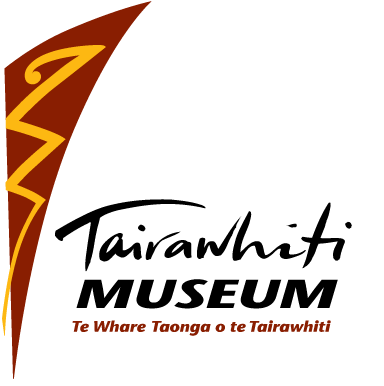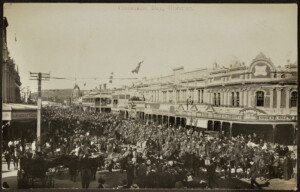East Coast Electorate cartoon cabinet card, 1887
East Coast Electorate cartoon cabinet card, 1887
written by Christine Page, Archivist
A short time ago we were contacted by Graham Titley of Shipley in West Yorkshire, who had acquired a cabinet card which is a reproduction of a political cartoon. After some on-line detective work he was fairly certain it originated here, and very generously offered it to us for our collection.
The card portrays Michael Gannon, Andrew Graham, and Allan McDonald, who contested the East Coast electorate in the general election held in September 1887. McDonald had already held the seat; he had defeated George Morris in the 1879 election, and only just managed to retain it in 1881, defeating Samuel Locke by a mere 19 votes. He resigned the seat in May 1884 in order to attend to personal business in England. The way he went about it caused much ill feeling, and after his departure columnists in the local newspapers did not hold back from expressing their disappointment at his behaviour, the opinion expressed in The Telephone being that …. our member has for a long time past entirely lost sight of any question or matter outside the limited circle of self, party, or Company, and that the interests of the district were completely subordinate to the three former engrossing matters.[1]

Allan McDonald
The Poverty Bay Herald was even more scathing in its comments on his departure. We have got rid of a representative who has treated politics as a turf-sharper treats those foolish enough to trust him ; who has imported all the roguery and rascality of the course into public life. We have now only to be thankful that we have got rid of a man who cannot be characterised in terms consistent with decency.[2]
The candidates for the seat left vacant by McDonald’s resignation were Samuel Locke, Michael Gannon and William Rees. Rees and Wi Pere were instrumental in the formation of the East Coast Native Land Settlement Company, which was set up with the intention of facilitating the leasing of Māori land. Rees was just one of the many lawyers practising here – indeed, according to the Evening Post, by 1884 Gisborne was a very hot-bed of litigation, and had the largest number of lawyers per head of population of any district in New Zealand.[3] The Poverty Bay Herald concurred, nor did they think this was something to be proud of, and quoted an old adage “Where the dead carcase [sic] is, there will the vultures be”.

William Rees
ATL (PAColl-0838)
35mm-00147-B; F
Photograph by William Henshaw Clarke
Locke was returned with a comfortable majority, but was then taken to court by Rees, who claimed that he was guilty of bribery and corruption.[4] Evidently the case provided considerable entertainment for the public of Gisborne, and a local photographer even went so far as to take a group portrait of the twenty-seven witnesses.[5] In the end the charge was dismissed,[6] and Locke was re-elected at the general election which was held just days later.

Samuel Locke, 1880s
ATL-Group-00214: 35mm-00102-B-F
McDonald returned to Gisborne at the end of 1884. One of the first things he did was call in to the offices of The Poverty Bay Herald; unsurprisingly he had taken exception to some of their comments regarding his resignation, and a retraction and apology was duly published.[7] In October McDonald was in the news again – this time because in response to a large and influential requisition,[8] he had accepted nomination as a Mayoral candidate following the resignation of Cecil de Lautour. As no-one stood against him, he was elected unopposed on 14 November[9], thus becoming Gisborne’s seventh mayor in nine years.[10] However he had been in office just under a year when he resigned, citing the death of his property manager as the reason.[11] At the beginning of 1887 it was rumoured that he would stand for the seat of Marsden[12] (where he also owned property). But instead he made another attempt to be re-elected to the East Coast seat. Samuel Locke did not seek re-election, but retired due to poor health (he died in 1890) so the only candidates were the three men portrayed on the card.
At this distance in time, some of the references in the cartoon are a little puzzling. Luckily the original artwork was displayed in a local hotel, and was considered noteworthy enough to merit a lengthy description in the Poverty Bay Herald :
There is at the Albion Hotel a most amusing election cartoon by a local artist, showing in the centre Mr Graham discoursing sweet music for Mr McDonald and Mr Gannon, but expressing inability to play one tune suitable for a Government reel and an Irish jig. There are four corner scenes. On one is depicted the capture of a right whale by the Poverty Bay electors, where the electors are shown as likely to capture that regular whale Andrew. Gannon is spouting to all eternity, and McDonald is represented as sounding, tail up. A monument is erected on the lone shore to Allan, who could blow a lot but could not spout. In another corner is a hunting scene on the road to Wellington. A.G. is leading on the good nag Colonial Policy ; Gannon is next on an overtrained filly, pedigree unknown ; and Mac is being bucked off by that powerful charger known to all the constituencies of New Zealand as the Working Man Colt. The Tower of Babel, enveloped in a thundercloud, is shown on the third corner emitting a copious discharge of lightning, which is striking the harps of two leading politicians as they are engaged stringing their lyres to a tune composed of all flats to suit the ear of an imaginary constituency. The last corner shows the end of the world, the bursting up. of all things, if each and every candidate is not returned. The three candidates are blowing their own trumpets into chaos, inviting the free and independent to come to Judgment.[13]
The comment of a correspondent to the Poverty Bay Herald shows why McDonald was portrayed as being about to be bucked off the “Working Man Colt” – He poses as the working men’ friend, and yet is bound up with the banking and run-holding interests. Is the working man to be thus deluded and make a stalking horse of in order to gratify the ambition of an ignorant amateur?[14]

Land acquisition and development was still a driving force in the electorate, and all three candidates in the 1887 election were, or had been, involved in land transactions of one kind or another, as was pointed out in a newspaper article. The three candidates before us, however otherwise they may differ, are alike in this, that they are all directly interested in getting completed titles to land bought from natives. That is not in the slightest degree discreditable to either ; indeed, it is the misfortune of each. But it is a question of degree with us all…….Each candidate desires an improved native land law, and two of them will be directly benefitted by it, while as to Mr Graham, a company for whom he is agent might or might not benefit by it, any benefit simply meaning that they would be saved from further loss.[15]
The candidates made their final addresses on the weekend before polling day. Gannon’s meeting was relatively orderly, the same could not be said for the other two. However election day itself was comparatively uneventful, and it was noted – perhaps slightly regretfully – that there were no arrests. There was though a slight hiccup at the Court House, when some of the voters put their ballot papers down the ventilator instead of into the ballot box.[16] At about seven o’clock people began to gather on Read’s Quay to hear the results as they came in. It was considered that compared with previous years, the effects of alcohol were less evident, however the crowd was still sufficiently fired up to pelt the Salvation Army with eggs when they marched through the town.[17]
The election was was won by Andrew Graham (who actually did play the flute) with 744 votes. Perhaps surprisingly, given that he had not shown himself to be entirely reliable previously, McDonald polled second with 583 votes followed by Gannon with 320. 25 votes were either informal or rejected, a total of 1672 votes cast The relatively low voter turnout (72%) was still slightly above the national average of 67.1%.[18] (The election for the Eastern Māori electorate had been held two weeks earlier : the seat was won by James Carroll, who defeated Wi Pere, the sitting member.)

Andrew Graham
In October 1889 Andrew Graham resigned the seat, and a week later he filed for bankruptcy[19].
Less than six months later Michael Gannon was also bankrupt. [20]

Michael Gannon
McDonald never actually became a bankrupt, but he lost all his properties – except a small piece of land in North Auckland. A writ of sale was issued against him in 1888, and things went downhill from there, with the auction of his Whangarei property in May 1889, followed soon after by Default of mortgage sales of Turihau and Puatai Stations. In July four judgement summons against him had to be withdrawn as he had left Wellington for Europe at the end of June.[21] He returned to Gisborne in 1892, moved to Otago, and then departed again in 1893, this time for Melbourne. After arriving there and putting his luggage in his hotel room he went out, and was not seen again. It was only after the police had searched his bags that his connection to Poverty Bay was revealed.[22] Five years later came reports that he had been seen, alive and well, in another part of Australia. The Observer noted this reappearance, but was not unduly surprised by it : Just so. We have heard of similar resurrections before now. Allan is not the only New Zealander by a long chalk who has performed this miracle.[23] What actually became of him remains a mystery. Only last year an Auckland lawyer was trying to trace any surviving successors in order to resolve the ownership of the Northland property. As of September 2023 no confirmed descendants have been in touch.
[1] The Telephone 21 April 1884
[2] Poverty Bay Herald 30 April 1884
[3] Evening Post 25 September 1884
[4] Poverty Bay Standard 17 July 1884
[5] Poverty Bay Standard 17 July 1884
[6] Poverty Bay Herald 19 July 1881
[7] Poverty Bay Herald 7 January 1885
[8] Poverty Bay Herald 10 October 1885
[9] Poverty Bay Herald 14 November 1885
[10] Poverty Bay Independent 15 October 1885
[11] Poverty Bay Herald 8 September 1886
[12] Poverty Bay Herald 15 January 1887/
[13] Poverty Bay Herald 23 September 1887
[14] Poverty Bay Herald 23 Septemver 1887
[15] Poverty Bay Herald 9 September 1887
[16] Poverty Bay Herald 27 September 1887
[17] Gisborne Standard 27 September 1887
[18] https://elections.nz/democracy-in-nz/historical-events/1853-2017-general-elections/?ref=btn
[19] Poverty Bay Herald 21 October 1887, 28 October 1887
[20] Poverty Bay Herald 7 March 1890
[21] Poverty Bay Herald 28 June 1889
[22] Poverty Bay Herald 5 September 1893
[23] Observer 31 December 1898



